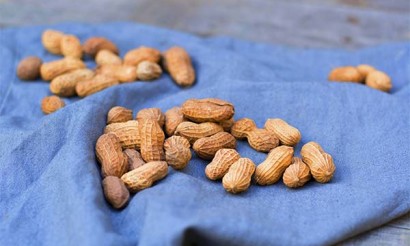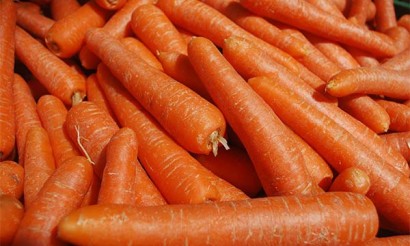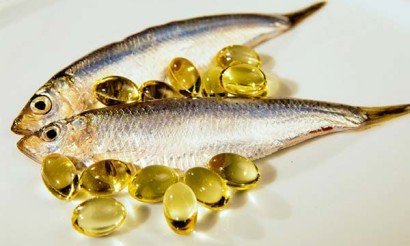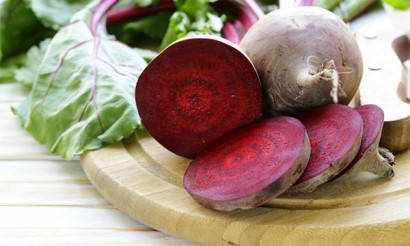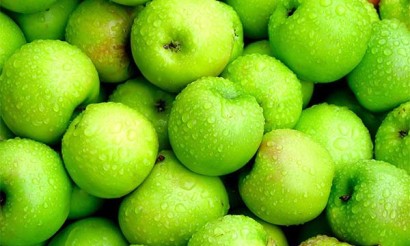Ginger when breastfeeding: the benefits and harms
When striving to lead a healthy lifestyle, almost everyone wants to diversify their diet, and pregnant women are no exception. And with each year, such a product as ginger is gaining in popularity. Many people know that the root of this plant has medicinal properties. It is added to tea to treat colds and other viral diseases, it is used pure, and since ancient times, oriental cuisine has used ginger as an additional garnish to a dish. But where did this plant come from, why it has gained such popularity, is it possible to eat it for pregnant women?
- History of origin
- The benefits of ginger
- Harm of ginger
- Can you eat ginger when breastfeeding
- The first month
- In the second month
- How to Use Ginger Properly
- How much can I eat per day?
- Can I eat ginger at night and on an empty stomach?
- The benefits of ginger when breastfeeding
- Is Pickled Ginger Useful
- The benefits of ginger tea when breastfeeding
- What are the dangers of ginger during lactation
- How to properly introduce ginger into the diet of a nursing mother
- Interesting Facts
History of Origin
Even in ancient times, man learned that the root of ginger brings great benefits and began to actively cultivate this plant. At one time the root vegetable was an important subject of stories and legends, it was considered almost a jewel and was taken from pirates. At one time, ginger root was even used for trade instead of money.
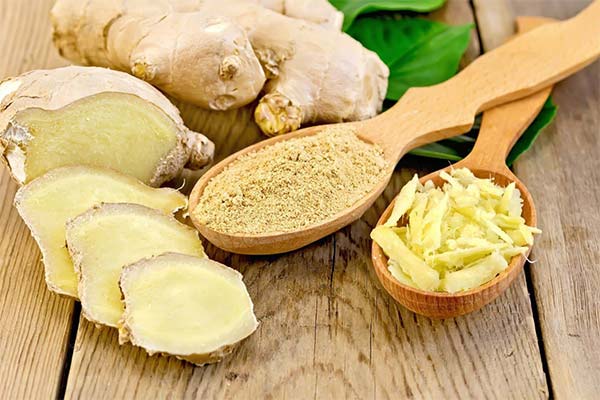
The history of this plant goes back to ancient times - today it can be counted in millennia. Centuries have changed, cities were built and ruined, large-scale wars took place, and ginger has not lost its popularity at any point in history. India and China made ginger the main part of medicinal procedures many hundreds of years ago and even included it in all textbooks. Nothing has changed over the years of the empires in this respect: ginger is used today as often as it was thousands of years ago.
Archaeologists have found the oldest evidence of the spice's use during excavations. Sacks of ground root were found in ancient Chinese tombs, which were used to drive out evil spirits and protect. It was believed that this ritual promoted well-being in the afterlife.
But ginger was not only used in the world of the dead. Living people also used the root in their rituals - it was believed to purify the soul and body, get rid of evil spirits and help establish contact with the afterlife. Religious sects have not ignored the product - despite the large-scale ban on spices, members of such religious communities were allowed to eat ginger.
Later on, the root became a part of many cultures and religions. It is often mentioned in sacred writings and is still an integral part of many cultures. Ginger was also appreciated by seafarers - it was an excellent remedy for nausea and seasickness. At one time, a small amount of ginger could even pay for an entire household.
The plant has spread all over the world and today it is used in several spheres at once. It is used to make medicines and cosmetics, as well as a component of culinary masterpieces and as a spice. Often it is added to tea to get an unusual flavor and to cure colds.
The Benefits of Ginger
Today, ginger is not just a popular spice around the world, but also a great cure for colds, nausea and other unpleasant diseases. Since ancient times, mankind has been aware of the useful qualities of this product. Over the years, the situation has not changed at all - ginger is still important to the whole world, and the areas of its application are expanding with each passing day.
In the composition of ginger can be found a surprising number of vitamins, minerals and essential oils, which is due to its wide popularity. The most popular effect of this plant is an effective help for various types of intoxication, including those accompanied by nausea and vomiting. This is due to the large amount of magnesium in the root, which effectively and quickly removes toxins from the body. Also, thanks to the regular intake of ginger, many people have an improvement of the nervous system.
Another positive impact on the human body produces an abundance of fiber, which helps the digestive system and the production of all necessary substances. The body significantly reduces gas formation, at the expense of which discomfort disappears. The metabolism is accelerated, so that all the useful elements of food are assimilated, and the excess is removed from the body.
Today, doctors recommend to eat ginger to people who suffer from blood clots, because this product is able to thin it. At the same time, it improves blood circulation in the blood vessels, thereby minimizing the likelihood of blood clots. The same effect has on the reproductive system - ginger is rightly considered an aide to sexual life.
Also, this root vegetable is often used to treat colds, successfully strengthens the immune system and helps to cope with a runny nose and stuffy nose. The root is known for its antibacterial effect, and the presence of a large number of vitamins allows the prevention of viral diseases.
Ginger is also useful for athletes, when dehydration occurs against the background of strenuous training. The product is rich in potassium, which helps to absorb fluid and maintain all systems in normal condition.
The dangers of ginger
Despite the fact that for hundreds of years, ginger has been considered a very beneficial product, there are negative aspects of its consumption. For example, it is strictly contraindicated to eat the root for people suffering from gastritis, ulcers and other diseases of the gastrointestinal tract, because this product due to its sharpness irritates the mucous membranes and can lead to unpleasant consequences.
Ginger also has an active effect on the liver and kidneys, increasing their work. Therefore, people who have noticed disorders in the area of these organs or have been diagnosed with cirrhosis, the use of the root is strictly prohibited. Otherwise, after using such a product, the symptoms may worsen, and the course of the disease will be noticeably complicated.
Also, ginger is contraindicated for people with circulatory disorders, high blood pressure and serious heart diseases. The fact is that the spice increases blood flow, due to which such pathologies can worsen. It is important to understand that not only pure ginger should not be eaten, but also other products based on it, including ground powder.
Caution should be exercised when eating pickled ginger. As a rule, vitamins in such a product are much less than in the raw root, and the salts used to prepare the dish can have a negative impact on human health. It is also important to consider that each body reacts individually to the substances contained in the root of ginger, so it is important to monitor the body's reactions and in case of unpredictable phenomena to cancel the intake of food.
Is it possible to eat ginger while breastfeeding
A woman who has recently given birth to a child, probably with great responsibility refers to her diet. It is not even in the habits that have been developed in the process of nurturing the baby, but in the period of lactation or breastfeeding the child and his health also depend on the mother's diet. Therefore, if a nursing mother eats a product rich in vitamins and other useful substances, the newborn also receives these necessary substances for growth and development with the milk.
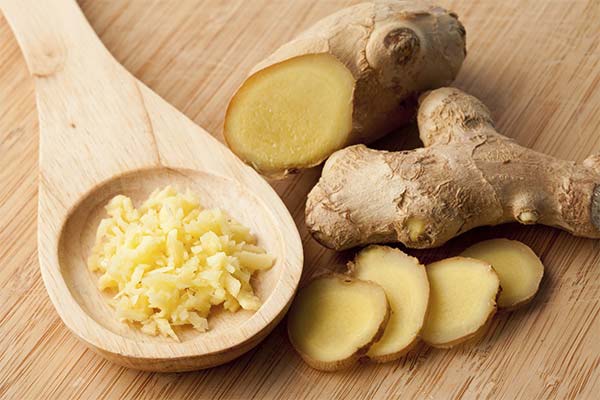
For many years there has been a debate about whether a nursing mother can eat ginger. Some experts say that this product is a must during the lactation period, other experts believe that ginger is a real poison for the mother and her baby. The picture is clarified by studies that claim that it is possible and even necessary to eat ginger during lactation, but not every mother. This is due to the individual characteristics of the body of the woman and child, the presence of allergic reactions and concomitant diseases.
In the first month
Breastfeeding in the first month after birth - it is the most responsible process, because at this time, the baby is not yet adapted to foreign food and store-bought baby food. That is why doctors recommend that women in this period especially monitor their health, paying attention to any little things. It is not recommended to eat ginger during this period, because the baby's body is not yet stronger, so the product, coming with the mother's milk, can cause severe intestinal colic.
Of course, if the child at this age does not suffer from gastrointestinal diseases, a woman can afford a small amount of ginger. But after the first use of the product and subsequent feeding, it is worth paying attention to the child's health - if such a diet reflects negatively on it, from ginger will have to give up for at least a few months.
In the second month
In the second month, the use of ginger should be treated with the same caution. The fact is that not all babies at this age have a strong intestine. Ginger can irritate the mucous membranes, and a weak child's body only needs a small amount of the substance to have extremely unpleasant consequences. If a child of this age is not bothered by constipation, colic and bloating, a woman can try to introduce a small amount of ginger into her diet.
When introducing the root into the diet, it is necessary to be sure to monitor the reaction of the baby, because this product can cause negative reactions. Despite the fact that the spice is able to enrich the body with vitamins and get rid of toxins, a child's body is still not adapted to such products. If you find unpleasant symptoms or increased tearfulness of the baby should immediately exclude ginger from the diet and seek help from a medical specialist.
How to consume ginger correctly
If a woman decides to use ginger while breastfeeding her newborn, she should understand the full extent of responsibility for this process. It is important to know that if a mother has never eaten ginger, you should not start eating it at such a delicate period - the reaction of both the mother and her newborn baby can be unpredictable.
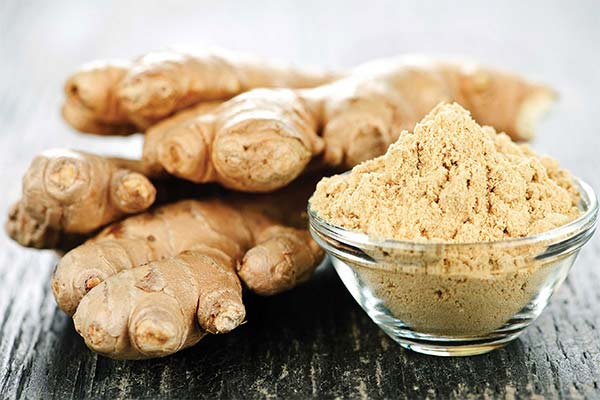
How much you can eat per day
It is believed that the use of ginger helps to improve the lactation process and increase the amount of breast milk. But experts insist that this product should be introduced into the diet when the child is two months old. It is better to eat ginger in the first half of the day, preferably before dinner, the dosage of the product should not exceed 3 grams. After the first intake of the new product, the mother should monitor the baby's condition - if within a day no negative reactions were noticed, you can continue to eat ginger. If the baby took the product normally, it is allowed to slightly increase the dosage every day.
A woman should understand that ginger has a property of blood thinning. That is why it is not recommended to use ginger if there were bleeding after childbirth, including hemorrhoids. Also, ginger has an effect on the mucous coating of the gastrointestinal tract, so if you have diseases of the intestine and stomach, you should refuse from the product. Ginger is not suitable for women with high blood pressure, it can cause mommy harm.
Can I eat it at night and on an empty stomach?
Since ginger is a strong irritant, it is categorically not recommended to eat it on an empty stomach and before going to bed. With such a diet, the useful elements of ginger will not be absorbed, and the negative reaction of the body will follow immediately. You should not consume ginger before going to bed also because it has tonic properties, increases blood pressure and, accordingly, can cause sleep disturbances.
The best option is to eat a small amount of ginger in the first half of the day after a meal, for example, right after lunch. In this way, the stomach and intestines are protected by other foods, and the negative effects will be minimal. Drinking ginger tea at night is also not recommended, as it can have an effect on the central nervous system.
The benefits of ginger during breastfeeding
The fact that ginger is useful for a nursing mother has been known since ancient times. The healing properties of this product are well studied, so a woman can confidently choose the appropriate dosage of the product to get the desired effect. For example, ginger is a great aid in getting rid of excess weight after having a baby, as this product speeds up the metabolism. Another pleasant bonus is that the root is able to significantly reduce the feeling of hunger, respectively, to prevent subsequent overweight gain by a nursing mother.
As a rule, women use the root for weight loss as one of the components to dishes - they add it as a spice. The feeling of hunger is significantly reduced, so the woman eats much less than she could and does not get extra pounds.
After the birth of a child, ginger can have a positive effect on the intestines as well. The fact is that young mothers are often tormented by gas in the intestines, so-called flatulence. Ginger helps to cope with this phenomenon, and it is also a great natural antiseptic, which gets rid of harmful bacteria and normalizes bowel function. This effect can be achieved only if the product is consumed in moderation.
Ginger root is able to start many important processes in the body, due to which important for life systems are renewed. Harmful toxins are removed from the body, a woman can keep her youthfulness and beauty much longer. Moreover, ginger root has a positive effect on lactation due to the large amount of essential oils. The product is used in order to maximize the lactation period. If no negative reactions are found on the part of the baby when using the root vegetable, such a diet will only benefit both the mother and her baby.
Is pickled ginger useful?
In Russia and many other countries in modern times, ginger has become popular as a spicy addition to Japanese dishes. The root is served in a pickled form, it has a pleasant pink hue and a peculiar spicy taste. But there is still a fierce debate about the benefits of such a product - some argue that it is completely useless for the body, while others insist on the opposite.
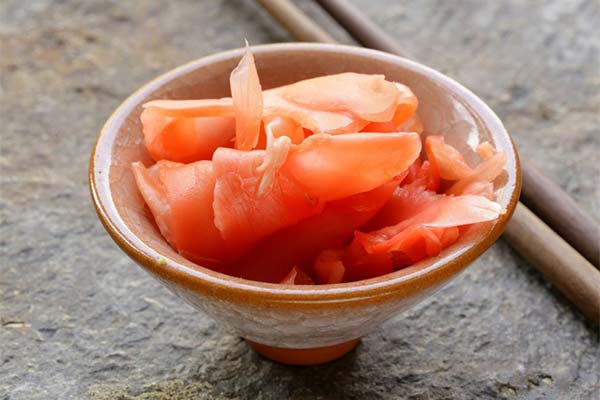
In fact, the properly pickled product retains all its beneficial properties - vitamins, minerals and even essential oils. Therefore, you can use it the same way as the usual ginger root. It is known that pickling does not get rid of any of the known qualities of the root, so there is no big difference in the choice of the product.
Marinated ginger is particularly useful in combination with Asian cuisine, where there is a large amount of raw fish. It is known that eating raw fish can have unpleasant consequences, so here ginger acts as a kind of protection against bacteria and possible infection.
Pickled ginger, as well as the product in its fresh form, has a tonic effect, and is able to rid the mouth of bacteria, due to which the breath becomes fresh. Intestinal bacteria are also destroyed, normalizing bowel function.
Use pickled ginger with caution, especially for women during lactation. Such a product has no less effect on the stomach than a fresh root, so people with diseases of the gastrointestinal tract from such a delicacy will have to give up.
The benefits of ginger tea when breastfeeding
Another popular way of using ginger root is adding it to tea and making a drink based on it. It is believed that such a drink is the best cure for colds, as well as a great way to strengthen the immune system. As a rule, a few small pieces of fresh ginger root are added to the most ordinary tea and allowed to brew.
This drink tastes like tea with lemon. In some recipes there is also lemon itself, which only enhances the beneficial effects of the drink. Ginger even in this state is able to have a positive effect on the body, preserving its best qualities.
But a woman who is breastfeeding should understand that even ginger brewed in a drink can be an irritant to the stomach and intestines, so women with diseases of these organs should abandon the use of ginger tea. The drink has a tonic effect, so it is not recommended to drink it to mothers whose babies suffer from diseases of the central nervous system. Also this drink should not be drunk before going to bed - such effects can cause sleep disorders, as a result of which the body will be weakened.
What are the dangers of ginger in lactation
It is known that not all products can bring exceptional benefits to the human body, especially when it comes to a young mother and her baby. Despite all its positive qualities, ginger is a product that should be used with maximum caution, otherwise the most unpredictable consequences are possible.
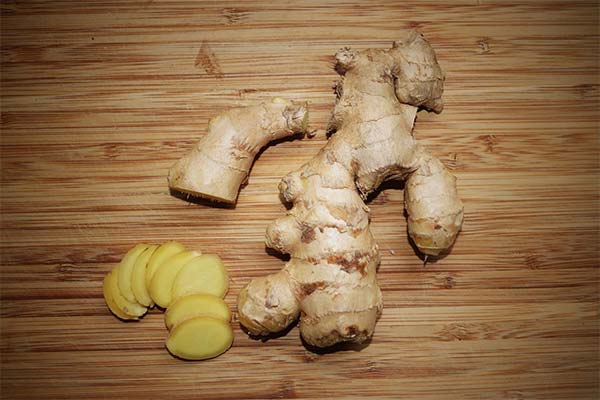
Ginger is still a spice, that is why it has a rather pungent characteristic aroma and a peculiar taste. At a minimum, it can cause a woman who is just recovering from childbirth, various reactions. A large amount of such a flavorful spice will certainly lead to unpleasant feelings in the stomach and heartburn, so the amount of root used should be treated carefully.
This circumstance is the reason that in the presence of diseases of the gastrointestinal tract, it is necessary to exclude the spice from the diet. And such abnormalities in the baby is also a reason to refuse the product.
Spicy ginger when consumed in its pure form can even cause small burns in the mouth. Experts recommend during the period of lactation to give up such a delicacy and use it only as a spice and additive to main dishes.
The presence of liver, kidney and gallbladder diseases, as well as stones in these organs also becomes a barrier to the use of ginger. It is important to understand that eating the root of the plant in the presence of such diagnoses can lead to a significant deterioration in health, as a result of which the woman will even have to undergo unscheduled specialized treatment.
Mom should understand that ginger is an allergen, and the baby with the mother's milk receives many of its components. The consequences of using ginger in the presence of allergies can be unpredictable - from red spots to tumors and other effects. If such a negative effect is detected, it is recommended to immediately refuse to use the product and contact a medical professional to exclude the occurrence of pathologies.
How to properly introduce ginger into the diet of a nursing mother
If there is still a great desire to eat ginger, a nursing mother will have to treat this process with the utmost caution. The fact is that the baby's reaction to new elements may not occur immediately - first, the mother's body will receive the components, then with milk they will enter the child's digestive system, only after that it will be possible to identify the reaction of the newborn to ginger.
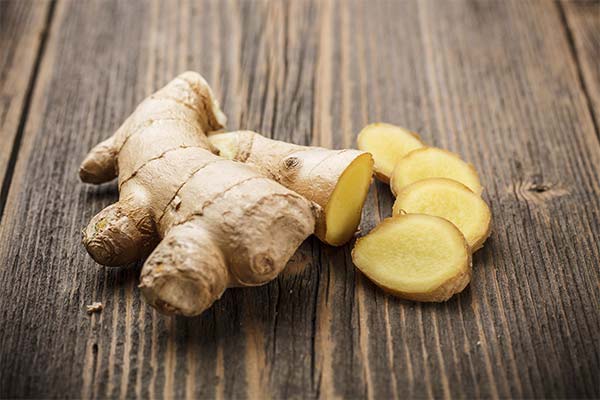
Introduce the spice to the diet should be slow and gradual. To begin with a woman will have to add a small amount of ginger in her food - no more than three grams in the first half of the day. During the day, it is recommended to closely monitor the reaction of the child: if there are no negative consequences, you can gradually increase the dosage.
Important! You should never use ginger in large quantities, even if the baby reacts normally to the new supplement. Excessive use will have a negative effect on the stomach, increase blood pressure and have a negative effect on the quality of sleep.
If, after eating this spice, a woman notices an allergic reaction in herself or her child, she should urgently consult a doctor. Continued use of ginger in this case is threatened by the forced refusal of breastfeeding, which will have a significant impact on the child's immunity and development. The same is the case with diseases of the gastrointestinal tract. If the baby showed colic or other discomfort, from ginger should be abandoned, and help in such a situation will only have a qualified doctor.
Interesting facts
- The great popularity of ginger root in Eastern countries is the reason that women in these countries do not give up their favorite spice even during pregnancy and breastfeeding. In most cases, such a diet does not bring terrible consequences for health, because oriental people are used to spicy food and are more resilient.
- Ginger is an excellent aid in trying to strengthen the immune system, so women make a tea from it. This drink helps to get rid of harmful bacteria in the body and eliminate toxins.
- Spicy ginger root is a great helper for women who want to lose weight quickly after having a baby. The root reduces appetite, due to this woman begins to eat normally, not worrying about the appearance of extra pounds.
A nursing mother should determine her own diet and understand that any product affects not only her body, but also the health of the baby.
«Important: All information on this site is provided for informational purposes only. for informational purposes only. Please consult with your health care professional before using any of the recommendations. specialist before using any of the recommendations. Neither the editors nor the authors shall be liable for any possible harm caused by materials."

